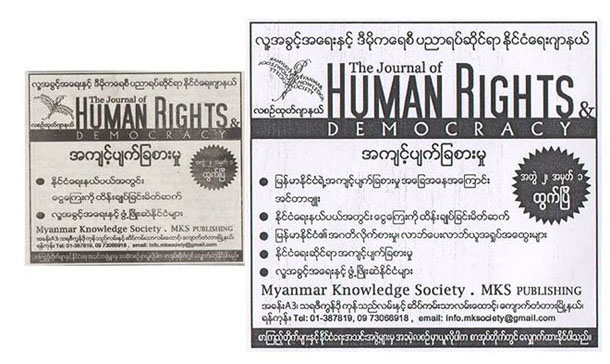RANGOON — Independent local media have alleged that state-owned newspapers The New Light of Myanmar and The Mirror are altering advertisements in an attempt to remove references to sensitive issues such as human rights and government corruption.
The New Light of Myanmar and The Mirror held a monopoly on daily news publication for decades, serving as mouthpieces of previous repressive military governments—which banned or severely censored independent media—and the current quasi-civilian government of President Thein Sein.
This special status allowed the papers to build up a large, nationwide circulation network that distributes about 300,000 copies of each paper daily, making the state publications an attractive place to advertise, especially for businesses that want to reach Burma’s rural areas.
Burmese independent media that advertised with the government papers complained, however, that in recent months the papers frequently meddled with language in the ads, removing references to politically sensitive issues.
Nyunt Win, editor of the monthly Human Rights and Democracy journal, said he advertised the journal’s upcoming issue in mid-January with ads that announced cover stories on corruption in politics and government.
“But when we see our ads in both [government] newspapers, [references] to corruption and bribery cases were removed,” he said. “We complained to them, but they said this is because of their advertising policy.”
“It’s terrible, they didn’t have any permission to change our ads because we paid money,” he said. “I can say that this is not freedom of media, actually they should inform us first.”
Ma Thida, a leading Burmese writer and activist who is an editor atPae Tin Than, said the weekly news journal had also seen their ads in government papers changed without permission last month.
“We advertised in both state-run newspapers for our weekly journal, but the newspaper’s advertising department edited our ads, which included comedian Zaganar’s serious comments criticizing the current government and some politicians and parliamentarians,” she said. “They removed such wording in the newspapers, we found after publication.”
Zeyar Hlaing, editor of the monthly magazine Mawkun, said his ads in the government papers had undergone a similar treatment in November.
“We just focused on the country’s [unmarried couples] living together situation, we had special reports about this, but when I was speaking with The Mirror’s ads department manager he said that they want me to change some wording that is not suitable with Burmese culture. He said it is not allowed, so I decided not to advertise there,” Zeyar Hlaing said.
President Thein Sein’ government has implemented sweeping political reforms since taking office in 2011 and the media has been allowed greater freedom. Censorship was lifted in 2012 and last year independent private dailies were allowed for the first time in decades.
The New Light of Myanmar and The Mirror remain under direct control of the Ministry of Information, which has announced that state broadcaster MRTV and both government papers will soon be transformed from propaganda-spewing outlets to public media after the adoption of a Public Media Bill. Independent publications have objected to continuing government support for the papers, saying it creates an unfair market advantage, adding that no democratic government in the world owns a newspaper.
The members of the independent media said the examples of the papers’ restrictive advertising policy showed that the government mouthpieces, despite their public pledges of reform, remain focused on limiting public access to information and protecting government interests.
“It means, their ads department still don’t know what their newspaper’s policy is and where are they going to. There is no accountability whatsoever,” said Ma Thida, of Pae Tin Than journal. “The Ministry of Information’s policy has not changed, except for dissolving the censorship for media,” she added.
Zeyar Hlaing of Mawkun said, “For a long time they have been doing this, we will have to ask them whether they are cheating the public or not.”
Tin Maung Than, an editor at The New Light of Myanmar, confirmed the paper alters private ads but said this is coordinated with the advertisers, adding that the policy is implement for add concerning “religious and national issues.”
“The editorial team and advertising department have a different policy, but what I can say is that we’re negotiating with advertisers if their ads concern religious or national issues in order not to harm any people or organizations,” he said.“If some ads are leading to misunderstanding … we negotiate with them to change some wordings.”

















